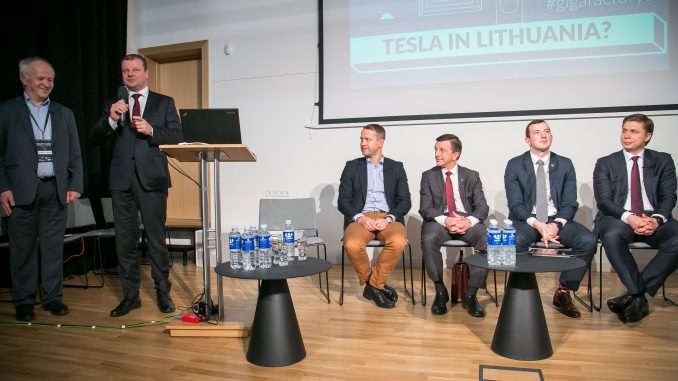
On Thursday the meeting was held at Martynas Mažvydas library where enthusiasts of the idea discussed whether the construction of a gigafactory and the 6000 thousand jobs created by it would create a wave of returning expats.
“A Sąjūdis can happen in these times as well. People, perhaps somewhat cautiously, but say that they would definitely return, if it happened,” said Vladas Lašas, the businessman behind the idea of bringing in a Tesla Motors gigafactory to Lithuania.
“Seeing the enthusiasm itself, which gathers momentum, I could not miss this event. The goal raised may appear to be a fantasy to some, but we have to raise such goals and believe in them. This idea is easier to achieve than the Sąjūdis of yesteryear and the independence achieved through it,” said Prime Minister Saulius Skvernelis.
He promised that the government would put in every effort to pass the necessary decisions If the idea of establishing a gigafactory in Lithuania catches on.
“It’s like in that anecdote – you don’t buy the ticket, you never win. We as a country have to have the ambition to invite Tesla Motors,” said Minister of Economy Mindaugas Sinkevičius, albeit conceding that the likelihood is not particularly high.
“This depends on not only the government’s efforts, but even if we fail to attract this investment, just by seeking it we could make Lithuania better known. You never try, you never know,” said the minister.
Sinkevičius quipped that if head of Tesla Motors Elon Musk arrived to Lithuania, he would not only meet Musk at the airport, but would even “carry him on my hands”.
“We have the necessary infrastructure. We already calculated that a gigafactory would definitely fit in the Kruonis territory,” head of Lietuvos Energija Dalius Misiūnas said.
He noted that this has to be a common project of all government institutions because specifically a lack of such an attitude is what prevented Lithuania from luring in Google.
Seimas Economics Committee Chairman Virginijus Sinkevičius reminded that Lithuaniais capable of implementing difficult projects, giving the example of the LNG terminal in Klaipėda.
“Together we can review the whole industrial sector in Lithuania. Also the procedures which currently take a very long time, up to half a year even,” he noted.
When asked whether politicians who would oppose bringing Tesla Motors to Lithuania could appear, Sinkevičius joked that he would like to see the party that would oppose this.
“Let me remind you that after the fall of the Soviet Union Finland decided it needs to produce something and began doing so. What followed was an economic breakthrough and it shows that our goal is correct,” said Kaunas Technology University rector Petras Baršauskas, adding that Lithuania has no lack of specialists who could work in the planned gigafactory.
“There is no question that Lithuania needs to diversify its economy from services to production,” spoke Investuok Lietuvoje (Invest Lithuania) head Mantas Katinas.
He also explained that during recent years the investment environment improved, particularly judicially.
A love letter won’t suffice
M. Sinkevičius promissed that if the process would demand financial assistance, the Ministry of Economy should provide it.
“We cannot go with a “love letter”, we should go with specific proposals, with our homework done,” said the Minister of Economy.
M. Katinas concurred, stating that it is necessary to come to agreement among ourselves before inviting Tesla Motors to Lithuania.
“There has to be such a “silver bullet” and it would suffice on its own,” he explained.
Interest to build a gigafactory has been expressed by at least ten European states including Finland and Portugal.
Inspired to unite
The idea to strive to become a country where Tesla would establish their planned European gigafactory was proposed by V. Lašas at the end of last year.
“And if we all agree it is worth it – let us do so!” V. Lašas, who is a minor stockholder at Tesla Motors, invited in a Verslo Klasė journal publication.
The businessman stated that the lithium accumulator demand and production will rise tenfold over the coming decades.
On January 4 a gigafactory opened in Nevada and is expected to double the total global production of lithium accumulators.
“Automated mass production will reduce prices by at least 30%. The gigafactory takes up as much space as 100 football fields, it will be the largest building in the world. It will employ 6000 employees. Tesla Motors, together with Panasonic, are investing 5 billion dollars and in 2020 the gigafactory will produce accumulators for half a million Tesla electric cars. Annual production – general 35 GWh lithium accumulators – would be worth 12 billion dollars in current prices,” explained Lašas.
The eccentric head of Tesla Motors Elon Musk has already begun seeking a location for the second gigafactory planned in Europe.
V. Lašas proposes to convince him that Lithuania is the best option for the project, it would help the state make great progress.
E. Musk’s name is currently one of the most well known in international media.
He is also a head of the space technology company SpaceX and solar panel maker Solar City, as well as a co-creator of the online payment system PayPal.
According to the Forbes magazine, E. Musk has USD 12.4 billion in property.
E. Musk stresses that the goal of his companies is to change the world and humanity. The businessman hopes to not only halt climate change, but also establish the first Mars colony.

Be the first to comment